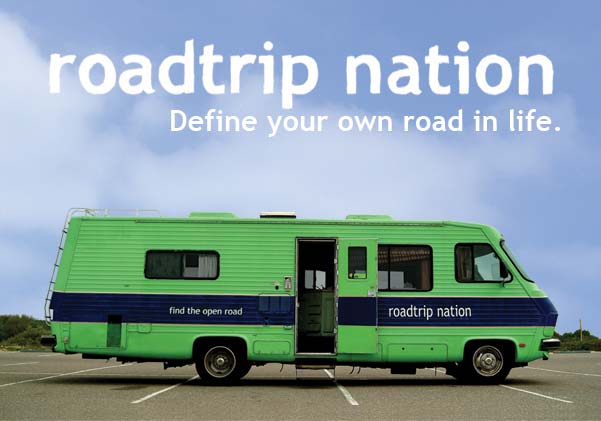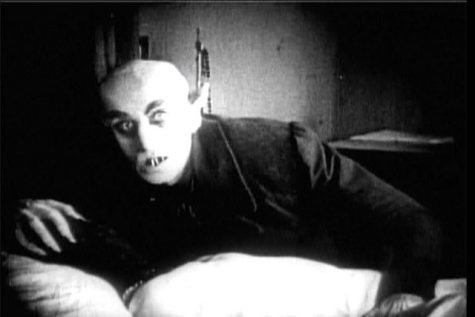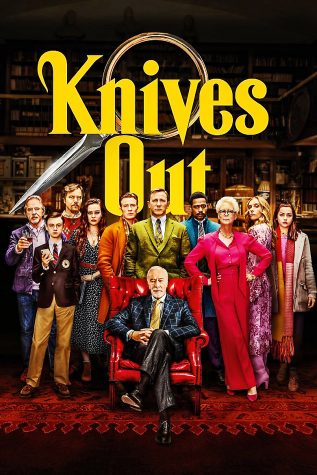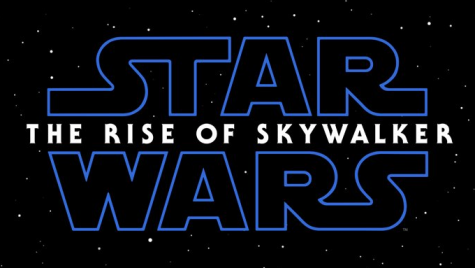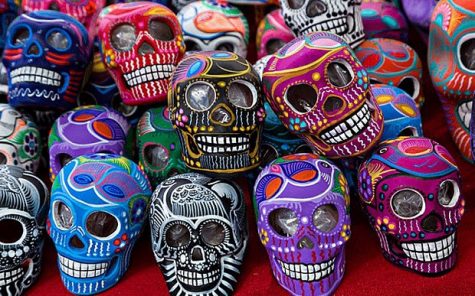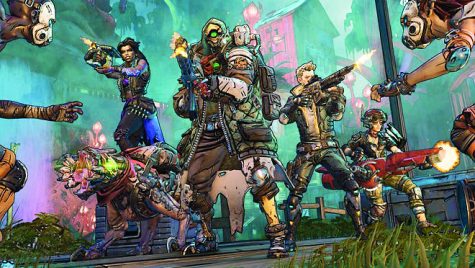Editor-in-Chiefs Interview Roadtrip Nation Participants
At SXSWedu there are a bunch of different types of educators, administration and students participating in the conference and speaking for their organization and ideas. One of these organizations is Roadtrip Nation: TEACH. A show about strangers embarking on a journey across the country in an RV, called the Green Van. On the trip, these participants plan and interview various people as they see fit. Some of these participants, Grace Worm and Rafael Silva, talk about their experience on the road and their plans for the future. I was excited to talk with them about their journey because I missed Ms. Worm (my former teacher) and wanted to hear more about her inspiring story.
Daniel Wallach: State your name
Grace Worm: My name is Grace Worm, and I am currently an outdoor educator for the national park service in Canyonlands National Park, which means I take elementary schools out of field trips in the parks in the area and I go and teach lessons in the classroom. It’s really awesome.
Rafael Silva: My name is Rafael Silva, and I go by Rafi. I’m a fourth year at UCLA, this is my last quarter, studying history with an education minor. I came in wanting to learn more about education and if it was the right path for me.
Wallach: Tell us about yourself…
Worm: I just moved from Austin, where I was going to school at the University of Texas and I was studying English and Education. I have been on track to be a teacher since early high school and I thought I wanted to teach middle school and then I taught at a high school and fell in love with it.
Silva: I had a bit of experience with education and I knew I liked working with youths but I was insecure about it. I was thinking about my job choice and about what my family and friends would think, it seemed like for others teaching was a step down for me. So I wanted to learn more about it and to see the value in it. That’s what the road trip gave me, I’ve become a lot more comfortable with my decision. I learned to be more comfortable with who I was and what I wanted and the values I wanted to live by.
Wallach: What in your life drove you and inspired you into wanting to be a teacher?
Worm: It was really interesting because when I was studying in college to be a teacher, every one talks about having one influential teacher that changed their path and made them want to be a teacher and I never really had that. I had a lot of really great teachers but never someone that I was like ‘I aspire to be you.’ I just kind of was walking down the hallway one day and I decided I wanna be a teacher that sounds like a good a job for me. Then the more I did with it, and the more experience I got in it, the more I realised I really loved it. But there was this awkward point where everyone I knew in college was headed down a certain path, they were going to take jobs as a high school teacher in the public school system in texas and probably spend the rest of their life there. I knew that wasn’t me but I didn’t want to give up teaching and so I was like ‘I’m going to have to sacrifice myself and I’ll be miserable but at least I’ll be doing something I love which is what lead me to the road trip ‘cause I didn’t know there were so many other types of teachers and educators out there that you could be. So I found now that you can kind of fit teaching to you and that was a good realization because I didn’t want to give up myself.
Silva: My first experience with education was my senior project in high school. I went to a project-based high school called High Tech High. I made something called ‘Rapidemia’ which was a rap based curriculum I designed for sixth graders that combined world history and english standards. I wrote an original rap with those standards and recorded a few raps, then i presented it to a sixth grade class. The whole process to me was really fun, all of it: writing, practicing, and lecturing. It seemed like something I could do.
And in UCLA, I saw that I was gravitating towards programs where I was working with high schoolers. I was an orientation counselor and I was a mentor of sorts to hundreds of students. I currently work in admissions as an undergraduate recruiter and in the presentations I saw that I was gravitating towards the high school environment.
Wallach: Tell us about Roadtrip Nation…
Worm: I didn’t know what I was going to do. I was planning on graduating in the summer and then my mom sent me an email with the caption, all caps, YOU NEED TO DO THIS. I didn’t really understand at first what it was, all I saw was education and travel around the country. That sounded like me. I didn’t really comprehend that it was a tv show, and I didn’t really know what I was getting myself into. I went through the interview while I was at Austin High student teaching which is funny because I remember mentioning it to a student ‘Ahh I applied for this thing but I probably won’t get it.’ It was this long application process, but they picked me and I had to decide between that and graduating in the fall or graduating in the summer.”
Wallach: What did you do with the roadtrip?
Worm: Once they told me I had made it, we had a little over two months to plan. They had a whole team that was doing some of the planning and getting in contact with some of the interviewees that we a little out of our reach. At the same time we were tracking down some of the people we really wanted to interview and trying to get interviews with them and all scheduled. ”
Wallach: And when you say interview what are these interviews of or about?
Worm: Our road trip was specifically about education and so we talked to educators, but we kept that definition really broad. We talked to a creator of a website and the leader of an improv troupe. We just looked at all kinds of educators, just a really fluid definition. Before the road trip, I didn’t really know what the interviews would consist of, but they were really amazing. They gave us so much freedom, we really only had to explain who we were at the beginning and what we were doing and then after that, there were no scripted questions, which was amazing for any kind of documentary or or interview that they let us do that as people who have no experience interviewing. We basically just had a one hour conversation with these amazing people. It was so cool to walk into the office of someone I admired and sit down with them, to ask questions like ‘when were you unsure of yourself in life,’ ‘did you think you weren’t going to make it.’ These are people that you just look at and think ‘that person is so cool, they have an amazing job and I could never be that’ and then you talk to them and they say ‘I quit my job for two years,’ ‘I had no idea what I’m doing,’ things like that. I had never had the space to ask questions like that before.
Wallach: What do you think you got out of that or are still getting something out of it, is it something that you can use in your professional life?
Worm: I definitely realized how often you think that you know someone, someone you consider close to you and you think about them all the time in your head, but you never say what you want to say or ask what you want to ask, and then after I went on the road trip I realized why am I not asking these questions. Like had I ever asked my dad, ‘when did you decide you wanted to do this,’ and it’s so silly because I had never thought to ask those questions. So I definitely try to make more of an effort to make those connections now. It has really changed how I view my relationships with people and I am making so much more of a conscious effort in that way. Even just reaching out to someone you considered unobtainable like a professor, but they’re going to respond because they’re human and even if they don’t who cares. The trip and the interviews stayed with me and in my mind.
Wallach: What was one of your favorite stories or gems of the journey?
Worm: There were definitely some really amazing people and some interviews that stay in my mind. For me it was kind of overwhelming at first and I was really excited about the traveling ‘cause I had never done them before and had no idea how I would feel about it. But there was this point in the road trip where I realized I was more excited about doing the interviews than the traveling and seeing the country. That was really huge for me. I became so much more invested in talking to people and I never wanted the interviews to end. And with it, it stopped being so emotionally overwhelming.
Silva: I learned a lot about people and about myself. I saw a great progression in myself where I was really invested in performing well in the interviews and there was this particular interview with this woman, named Melissa Michaels. She made me feel really comfortable with myself and for the first time on the trip, and for the first time in a while, I could say anything I wanted and it would have been completely fine. That was the most organic interview up to that point and from there, I tried to take bits of that and use them in different interviews. That was a turning point interview. Seeing Nolan Bushnell, the inventor of the Atari, was big for me personally because of video games, he’s a historical figure. That was so cool.
Also as I said I learned about people, our team went through flows and a turning point was in Ohio, when we realized we only had a few weeks left and we were gonna pull it together and we did. It was an extremely difficult thing to do, it’s not easy to get into an RV with four people and just go.
Wallach: Any themes across the country about education that you noticed?
Worm: I think what I found was that all these people were really passionate about education. It’s different to say you’re passionate about something and then interview someone who has spent 15 years of their life on this idea of education and what education should be, when you have a totally different idea of what it should be. These educators cared so much. It was interesting to have a different idea of what education was and then to see someone who had built a company around their idea of what it should be while still having a contrast in ideas.”
Silva: “The trend I saw was that everyone was taking their own route. We picked a wide variety of people on purpose and it was supposed to highlight the different paths you could take as an educator as well as that all the paths were valid. That’s what we were trying to learn.”
Worm: “It’s not like there’s a right way and a wrong way to do education, but there are better and worse ways. It’s about who you are as an educator and who much you can contribute, even if you need to find a different way so that it fits you. There are a lot of ways to fit yourself around education.”
Wallach: What do you think is next in life for you two?
Worm: “The road trip definitely gave me a lot of options and now I feel like I’m in a place with too many options. I’ve applied and been accepted into several different graduate programs both in English literature and education so that’s an option. I have also applied to a couple teaching positions and if I don’t teach right away I will definitely try and get a job at an international school after that.”
Silva: “For me, I’m doing this program called ‘City Year,” it’s like ‘Teach for America’, that’s how I always describe it,but it’s very different. City Year is a volunteer program when you enter into a low income school and you give them whatever support they might need, so you are helping the teaching administration base that’s already there with your team. That could be mentoring/tutoring individual kids or before or after school activities, just whatever they might need. After that I will probably be going to graduate school.”
Worm: “Both of what I’m doing now as an outdoor educator and what he’s doing with city year, we both got those ideas of the road trip. I met an outdoor educator on the road trip and we interviewed a woman who was working City Year on the road trip. We interviewed this woman in Yosemite and after the interview the filmers were asking for our after thoughts and I couldn’t even speak to the camera, it was so cool. I needed to do this.



